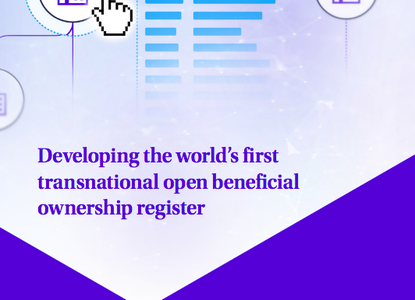Beneficial ownership transparency in Ukraine: what’s next?

In 2016 Ukraine became the second country in the world (after the UK) to implement a public register of the beneficial owners of corporate entities registered in country. It subsequently became the first country in the world to commit to integrating this data with the Open Ownership Register.
As the first step toward integration, the Open Ownership team undertook a holistic review of Ukraine’s current beneficial ownership regime. Working closely with Ministry of Justice officials and users in civil society and government, we assessed the impact of existing technical, business process, and policy frameworks on the quality and usability of Ukraine’s beneficial ownership data.
Today we are pleased to publish our findings in full. In Improving beneficial ownership transparency in Ukraine: Review and recommendations we assess the progress made so far and provide recommendations for strengthening Ukraine’s beneficial ownership regime.
Our assessment begins with the assumption that data usage determines whether the policy goals of stemming corruption and improving Ukraine’s business environment will be met. Overall, Ukraine has taken several important steps to make its beneficial ownership data accessible to users.
Since June 2017, the Ukrainian Ministry of Justice has made beneficial ownership data available as an open data set for bulk download (along with other company data). To date, approximately 253,000 Ukrainian companies have reported their beneficial ownership to the companies register.
At a leadership level there is a clear understanding of the benefits of beneficial ownership transparency across the private, public and third sectors. However, there is room for improvements that will make the realization of these benefits more likely. We identified a number of key areas:
- Level of compliance: The current low level of compliance (less than 20% of all Ukrainian companies are accounted for) demonstrates the need for a stronger system of sanctions and robust enforcement.
- Data quality: There are currently a number of limitations that lower the quality and usability of the data collected. These include a lack of beneficial ownership data in machine-readable format, unreliable systems of disambiguation for individuals and companies, a lack of granularity in the data (in particular on the means of control), and no representation of chains of ownership.
- Maintenance of records: Currently, no information is given on when the data was submitted, and no confirmation statement is required. This makes it impossible to assess the timeliness of the data being submitted.
- Validation: There is a clear need to close possible loopholes by requiring the reporting of detailed beneficial ownership data, including by using the definition of “beneficial owner” contained in the law as a basis for creating a clear test of beneficial ownership to share as guidance. The lack of in-line validation of beneficial ownership data at the point of collection, and inefficient processes of verification thereafter,
We have made a range of policy and technical recommendations to the Ministry of Justice, which are set out in full in the report. Our top line recommendations to the Ministry include taking action to:
- urgently address the problem of low compliance
- update regulations to require comprehensive data on beneficial owners and the disclosure of means of control
- remove the high 25% threshold of shareholding that beneficial owners must exceed in order for the reporting requirement to kick in
- create forms to collect beneficial ownership as structured data by default
- ensure that there are reliable means to disambiguate individuals and companies
Additionally, the Ministry of Justice needs to work with technical implementers to design inline validation and business rules into new forms for collecting data and processes for comparing it with other relevant datasets in order to verify its accuracy.
In conclusion, the steps Ukraine has already taken put it ahead of countries that have not yet transformed their commitments to beneficial ownership transparency into implementation. By implementing these recommendations and working to meet the highest standard on beneficial ownership transparency, Ukraine will continue to demonstrate its leadership in this field.
We’re proud to be part of this journey. We look forward to our continued work with our Ukrainian colleagues to achieve the ultimate goals of greater beneficial transparency: the reduction of corruption and strengthening of the business environment and good corporate governance in Ukraine.


